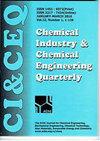微波加热射流热解制备CeO2的工艺研究
IF 0.8
4区 工程技术
Q4 CHEMISTRY, APPLIED
Chemical Industry & Chemical Engineering Quarterly
Pub Date : 2022-01-01
DOI:10.2298/ciceq220510034c
引用次数: 0
摘要
喷雾热解法的缺点是喷嘴堵塞,传统的加热模式造成温度梯度大,导致反应物受热不均匀。本研究以七水氯化铈为原料,以文丘里反应器为核心设备。结合微波加热技术制备了单相球形氧化铈。颗粒的平均尺寸接近80nm。通过XRD、SEM、EDS等技术对产物进行了表征。并与常规喷雾热解进行了纯度、形貌和能耗的比较。采用Fluent软件结合HFSS模拟了不同工艺条件对产品的影响。反应器内的纯度和温度场。实验结果与模拟结果吻合较好。结果表明,随着气速Vg的增大,温度场的分布趋势没有变化。当进气速度达到1.7 m/s时,氯元素的质量分数最低,为0.13%。当物料入口速度为0.05 m/s时,氯元素的质量分数小于0.1%,表明反应物反应完全。经计算,与喷雾热解法相比,加热成本、能耗和CO2排放量均显著降低。本文章由计算机程序翻译,如有差异,请以英文原文为准。
Process study of CeO2 preparation by jet-flow pyrolysis via microwave heating
Spray pyrolysis method has a disadvantage of nozzle plugging and conventional heating model causes a large temperature gradient, which leads to uneven heated reactants. In this study, cerium chloride heptahydrate and Venturi reactor were used as raw material and core equipment, respectively. The technology of microwave heating was combined to prepare single-phase sphere-like cerium oxide. The mean size of the particles was near 80nm. The product was characterized via the technology of XRD, SEM and EDS. The purity, morphology and energy consumption were compared with the conventional spray pyrolysis. Fluent software coupled with HFSS was employed to simulate the effects of different process conditions on products? purity and temperature field in the reactor. There was a good correspondence between experimental and simulated results. The results showed that as gas velocity Vg increased, the tendency of the temperature field distribution did not change. The lowest mass fraction of chlorine element reached 0.13% when the gas inlet velocity reached 1.7 m/s. When the material inlet velocity was 0.05 m/s, the mass fraction of chlorine element was below 0.1%, which indicated that the reactants had a complete reaction. It has been calculated that the heating cost, energy consumption and CO2 emission were decreased sharply, which compared with spray pyrolysis method.
求助全文
通过发布文献求助,成功后即可免费获取论文全文。
去求助
来源期刊

Chemical Industry & Chemical Engineering Quarterly
CHEMISTRY, APPLIED-ENGINEERING, CHEMICAL
CiteScore
2.10
自引率
0.00%
发文量
24
审稿时长
3.3 months
期刊介绍:
The Journal invites contributions to the following two main areas:
• Applied Chemistry dealing with the application of basic chemical sciences to industry
• Chemical Engineering dealing with the chemical and biochemical conversion of raw materials into different products as well as the design and operation of plants and equipment.
The Journal welcomes contributions focused on:
Chemical and Biochemical Engineering [...]
Process Systems Engineering[...]
Environmental Chemical and Process Engineering[...]
Materials Synthesis and Processing[...]
Food and Bioproducts Processing[...]
Process Technology[...]
 求助内容:
求助内容: 应助结果提醒方式:
应助结果提醒方式:


